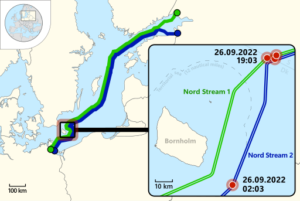BY DAVE GUTKNECHT
At last, we have a U.S. president who may not be completely beholden to the military-industrial complex and its lobby, or to the Israel lobby. Yet both of these extremely powerful forces, and a triumphalist outlook in U.S. ruling circles, make it difficult to alter foreign policy directions.
Here are condensed points slightly outside mainstream messages:
Trump, even before taking office, forced a pause in the genocide of Palestinians, in the same way that Biden and Blinken could have done more than a year earlier. The big question is whether the President will allow Israel to once again trash any agreement limiting its war aims.
 In early January, Trump held a lengthy press conference in which he mentioned a fundamental fact that very few U.S. politicians have said: An agreement between Ukraine and Russia was achieved in Istanbul within a few weeks after the 2022 invasion, but Biden stopped its implementation. Importantly, Trump also broached a key point on international relations: mutual recognition of security concerns. Trump in his usual manner spoke the obvious: “I can understand why Russia was concerned about NATO on its doorstep.” Anyone reviewing the history of NATO expansion and its wars could also understand this.
In early January, Trump held a lengthy press conference in which he mentioned a fundamental fact that very few U.S. politicians have said: An agreement between Ukraine and Russia was achieved in Istanbul within a few weeks after the 2022 invasion, but Biden stopped its implementation. Importantly, Trump also broached a key point on international relations: mutual recognition of security concerns. Trump in his usual manner spoke the obvious: “I can understand why Russia was concerned about NATO on its doorstep.” Anyone reviewing the history of NATO expansion and its wars could also understand this.
War in Ukraine through NATO was planned and provoked for years, despite being warned against by many Western diplomatic, scholarly, and military voices. European opposition was overcome in 2008, and Russian proposals for discussing new European security arrangements were repeatedly ignored. U.S. failure in Ukraine may yet lead to such talks, but the road ahead looks rocky. The strategy of war on Russia remains.
The Nord Stream pipeline destruction was a monumental act of sabotage against its owners in several European “allies” (Russia’s Gazprom was a minor partner) — a crime publicly promised by Biden himself but not honestly investigated. Add in extreme sanctions that have largely failed, and a Europe that thrived on Russian energy is seeing its economies thrown into deepening recession. Russian oil refined and shipped from elsewhere is more expensive. U.S. liquified natural gas also is more expensive, and Europe has continued purchasing some Russian gas. But the remaining gas supply to Europe through Ukraine has been recently cut, and EU energy disputes are sharpening quickly.
In early January, for the first time in EU history, a democratic election was suspended by a national court. Why? Because in Romania, the leading presidential candidate said he was not pro-Russian but pro-Romanian and did not support the war in neighboring Ukraine. Note the power of the military-industrial complex: NATO is building what will be Europe’s largest military base — in Romania.
For European nations, a question becomes evident: How much abuse will you be willing to take?
Trump, as mentioned, will surely take advantage of his bully pulpit. In early January, Trump reinforced his comments about Ukraine by posting on the X platform a link to an interview with the internationally renowned economist Jeffrey Sachs. In it, Sachs explained how the U.S. had provoked the 2014 overthrow of the democratically elected Ukraine government, then had prepared for war in eastern Ukraine, rejecting Russian proposed security discussions.
Thanks to Sachs and Trump, the latter’s millions of followers on X were exposed to the largely unmentioned U.S. history in Ukraine — but also in the Mideast. U.S. rulers, many of them U.S./Israel dual citizens, and the Israel lobby have been driving a war agenda — planning for war in seven countries ending with Iran, as testified by Wesley Clark on “Democracy Now” after 2001. Sachs also described Israel’s repeated sabotage of Palestine peace agreements. This is history that few Americans have been told by their leaders or media figures.
Ambrose Bierce: “War is God’s way of teaching geography to Americans.”
Here is a brief lineage of U.S. sponsoring of terrorism to weaken its global adversaries: In the 1980s, the U.S. armed the mujahideen in Afghanistan; the mujahideen begat Al Qaeda, which begat ISIS/IS (they’re “on our side” in Syria, said Hillary Clinton in an email released by Wikileaks); IS begat Al-Nusra, which begat HTS in Syria. HTS leader al-Julani, despite a murderous legacy, has now become respectable. This continues a long U.S. history of empowering tyrants: “He may be a head-chopper, but he’s OUR head-chopper.”
More chaos is growing in a fragmented Syria; and it looks like the Kurds will be betrayed once again.
Parting comments from Blinken, who has been the “Secretary of War” (NYT) and perhaps acting president, were remarkably divorced from reality. Journalists with questions about Palestine were ejected. He asserted that during Biden’s term our global standing and that of our allies was strengthened. That the position of our adversaries has weakened. That Ukraine is winning — a statement both cruel and delusory. That Israel was not committing genocide — contradicting the UN, the ICC, the ICJ, everyday horrific videos, and elementary honesty.
Good riddance!






















